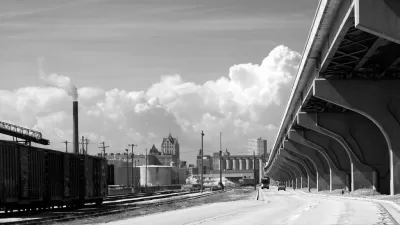Repairing civil infrastructure might require rethinking the traditional approach to building infrastructure.

"If I were President I would claim the 'Era of big (civil) Infrastructure is over' in the US," writes David Levinson at The Transportationist. "Not that we don’t have big infrastructure, we do, and it isn’t going anywhere soon."
To elaborate the point, Levinson debunks the potential of large infrastructure projects (i.e., high speed rail, urban transit, renewable energy, smart grid, water supply, and sewer systems) that some might be crossing their fingers for:
I think the transport investments are unlikely, the water investments are mostly piecemeal replacements, and the energy investments will be a set of many small, decentralized power generators rather than large facilities. In short change is likely to incremental rather than comprehensive.
Levinson doesn't exactly express regret over this state of affairs, rather he argues that "there is no point in spending resources for that given the increasingly high costs and diminishing returns that civil infrastructure faces."
Hat tip to Angie Schmitt for sharing the article.
FULL STORY: The Era of Big Infrastructure Is Over

Planetizen Federal Action Tracker
A weekly monitor of how Trump’s orders and actions are impacting planners and planning in America.

Chicago’s Ghost Rails
Just beneath the surface of the modern city lie the remnants of its expansive early 20th-century streetcar system.

San Antonio and Austin are Fusing Into one Massive Megaregion
The region spanning the two central Texas cities is growing fast, posing challenges for local infrastructure and water supplies.

Since Zion's Shuttles Went Electric “The Smog is Gone”
Visitors to Zion National Park can enjoy the canyon via the nation’s first fully electric park shuttle system.

Trump Distributing DOT Safety Funds at 1/10 Rate of Biden
Funds for Safe Streets and other transportation safety and equity programs are being held up by administrative reviews and conflicts with the Trump administration’s priorities.

German Cities Subsidize Taxis for Women Amid Wave of Violence
Free or low-cost taxi rides can help women navigate cities more safely, but critics say the programs don't address the root causes of violence against women.
Urban Design for Planners 1: Software Tools
This six-course series explores essential urban design concepts using open source software and equips planners with the tools they need to participate fully in the urban design process.
Planning for Universal Design
Learn the tools for implementing Universal Design in planning regulations.
planning NEXT
Appalachian Highlands Housing Partners
Mpact (founded as Rail~Volution)
City of Camden Redevelopment Agency
City of Astoria
City of Portland
City of Laramie


























